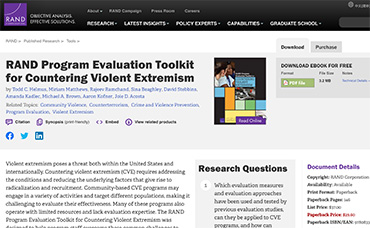External Resources
Other organizations work on the connection between evaluation and PVE has produced some content that better defines the various parameters for this type of intervention.
Here are few resources that will help to inform your thinking on this subject:
The BetterEvaluation website is another useful source of theoretical and applied content regarding
evaluation (most of it in English).
The BetterEvaluation website describes 25 different evaluation approaches, though this list
is not exhaustive.
The BetterEvaluation website offers highly detailed guidance on choosing appropriate evaluation
methods and processes, as well as a long list of data collection methods.
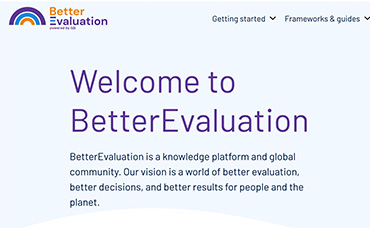
For over 40 years, the Canadian Evaluation Society has been dedicated to advancing excellence
in evaluation across Canada and internationally. Its website offers many relevant resources for
learning more about evaluation. The Canadian Journal of Program Evaluation is free to everyone
and offers useful resources for learning more about this field.
The Canadian Evaluation Society publication CES Guidance for Ethical Evaluation Practice is designed to help evaluators engage in ethical reflection so that they can make the decisions that are the most justifiable from an ethical standpoint, in light of the situation and the context. This publication includes an example of an ethical dilemma specifically involving pressure to misrepresent evaluation findings (in a context other than PVE).
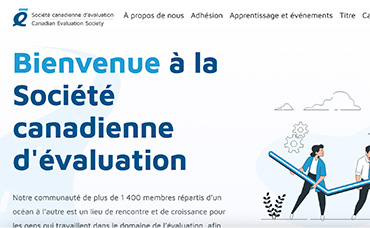
"The main purpose of the IMPACT Europe toolkit is to help professionals in designing and conducting evaluations in the CVE field. Robust and rigorous evaluations have not yet become the norm in the CVE field. Our understanding of what works in the field can be improved if we conduct more and better evaluations. The toolkit therefore also helps professionals to develop well-designed programmes, which are easier to evaluate and more likely to achieve results." (Quick guide)
The IMPACT Europe website also provides a list of evaluation approaches and methods.
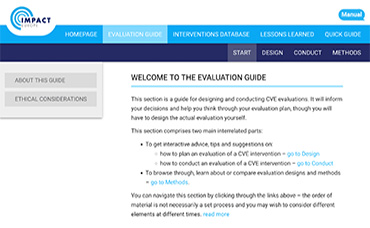
" The toolkit is divided into four sections to help you navigate to the parts that are most relevant to you:
- Laying the foundations explains approaches and principles that need to underpin projects related to PVE, including conflict and gender sensitivity.
- Building the framework offers tools for identifying factors of vulnerability and resilience to violent extremism in the project context, building theories of change, and developing indicators and monitoring.
- Monitoring strategy and data collection provides guidance and tools on developing a monitoring strategy and discusses and compiles different data collection methods.
- Evaluation using the learning provides details on evaluating PVE projects." Toolkit Presentation
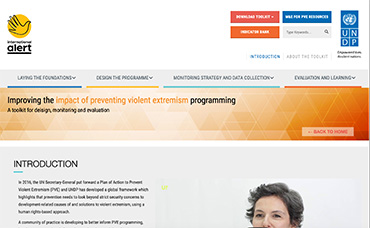
"Through checklists, worksheets, and templates, the toolkit takes users step by step through the process of determining whether their programs produce beneficial effects, ultimately informing the responsible allocation of scarce resources. The toolkit's design and content are the result of a rigorous, systematic review of the program evaluation literature to identify evaluation approaches, measures, and tools used elsewhere and will be particularly useful to managers and directors of community-based CVE programs and program funders." Presentation
